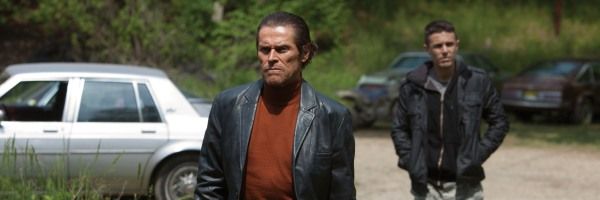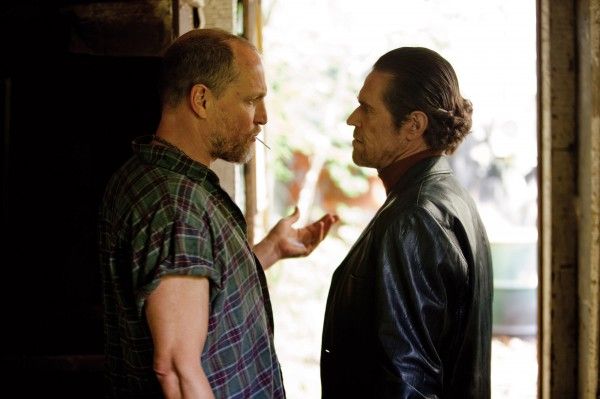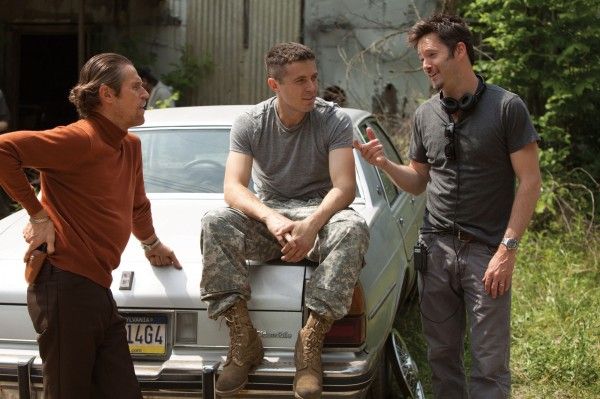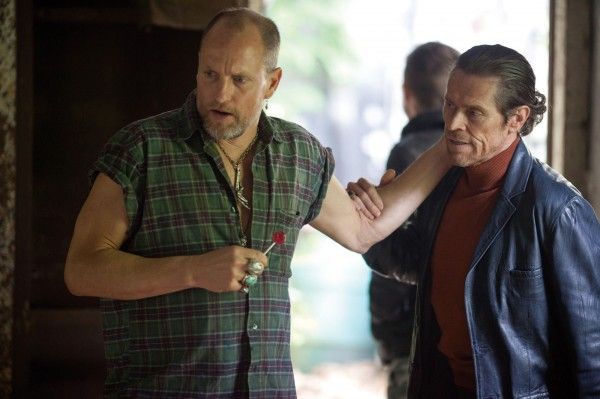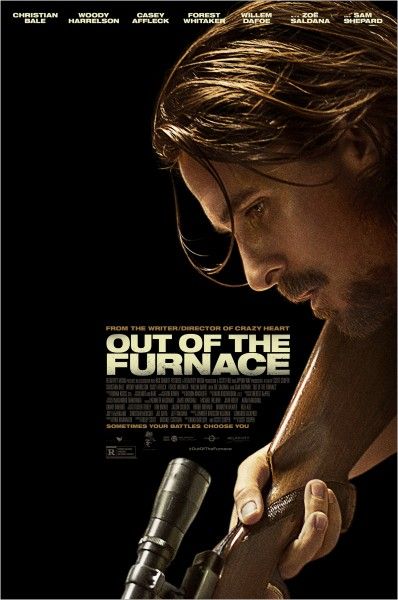Willem Dafoe delivers a finely drawn performance as a small town bookie in Out of the Furnace, Scott Cooper’s dark and gritty drama set in a struggling blue-collar Pennsylvania steel town. A local lowlife with connections, John Petty (Dafoe) is part of the community and friends with steelworker Russell Baze (Christian Bale) and his brother, Rodney (Casey Affleck), an Iraq vet struggling to transition back to civilian life. Petty knows the brothers have fallen on hard times, but Rodney is into him for quite a sum of money, and business comes first. Opening December 6th, the film also stars Woody Harrelson, Zoe Saldana and Forest Whitaker.
In an exclusive interview, Dafoe talked about how his sense of trust in Cooper combined with the strong script and an impressive cast was a big draw, why he enjoys playing characters that are conflicted and full of contradictions, what inspired him to bring an Eastern European flavor to his character, how he found Cooper to be a positive, confident director who values actors, his collaborative approach with the other actors, what shooting on location in Braddock lent to the film, and his upcoming projects including The Grand Budapest Hotel, Nymphomaniac and A Most Wanted Man. Hit the jump to read the interview.
QUESTION: Can you talk a little about how this project came together for you?
WILLEM DAFOE: I talked to Scott Cooper after he made Crazy Heart, and we talked about working together, and then he called me about a year later when this project came together, and he sent me the script. It was pretty straightforward. The only story is, usually when you meet with a director, just meeting them after you’ve seen something you’re interested in, they say, “Oh I’d love to work together,” and sometimes you never hear from them again. (Laughs) Well Scott meant it when he said he wanted to work together. He sent me the script. It was a good script. There were some actors attached at that time. It really defined the world. It defined what he wanted to do with it. He told me where they were going to shoot. I wasn’t real familiar with Pittsburgh, not specifically Braddock, but I thought, “Yes. Good. That sounds right.” It appealed to me. And then, of course, the character I liked because he has a central conflict that he’s a bookie, and at the same time, he’s invested in this family and invested in the community. But, in the end, he’s a bookie and business is business. That’s an interesting dilemma to have.
You were the last man in on this project. Is there anything special you did for the role in terms of either an accent, or picking up on the vibe of the period or the setting of a depressed community, and just fitting into what was already happening on set?
DAFOE: His name is John Petty, and I thought I would love to make him a character that kind of reflects that he’s the son of an immigrant, because in that area there’s so much feeling of the son of immigrants. There’s a lot of Ukrainians. There’s a lot of Croatians. It has a very particular vibe of all the people that came to work in the steel mills, and that was an important part of the story. So, I wanted him to have some sort of Eastern European flavor. The best way I could express that I thought was through a look and a hairdo that I remember I would see from people of the former Yugoslavia after the war went down coming over to Western Europe. It’s a look that I like very much. I thought that would be something for the character. And then, the clothes were very important because it struck me that he’s kind of a vain guy and he’s a figure in the community. Part of his business is creating a strong identity. You really get the feeling this guy is wearing the clothes he found 20 years ago when he was a young peacock, and he’s still wearing them. I liked that. There were lots of external things that I had fun working with the designers to establish. That was where we started. As far as the accent, I was really taken by the local accent which has all kinds of peculiarities to it. But really, when I got there, for the most part there was a choice not to use the accent because it was too particular, and it has very idiosyncratic things, and it would just confuse things. Like this idea of “yins” which is kind of like “y’all.” Sometimes they drop off the “to be.” If you say, “The car needs to be washed,” you might say, “The car needs wash.” There are little things, but that wasn’t enough to go on. And sometimes, even though that would have been fun to play with and might have rooted it and made it particular, it may have shut out some people because it would have been so confusing. So, I let that idea go. Since I was last man in, it was important to come and be in that world and see what other people were doing and just contribute and add another dimension as opposed to worrying too much about doing my thing.
Scott Cooper is an actor turned writer-director. How was the directing experience with him? What was it like bringing his vision to life?
DAFOE: He’s a very positive guy. He’s a very confident guy. Because he was an actor, he really values actors. I think he really tries to create a set that he wishes he would have had when he was an actor. Probably more so than your average director, the performances are a priority to him. And obviously, with this kind of script, performances are essential to really have the story live. He’s dealing with many different actors with different traditions, but all [have] strong careers and strong personalities. He’s smart enough to know that he has to work with what they’re bringing him. He was pretty good at being able to give people what they need and make them feel comfortable and try to calibrate the different energies and different modes of work, the approaches, which is no small feat.
When your role requires a lot of intensity and physicality, how do you play off actors like Christian Bale, Casey Affleck, and Woody Harrelson without delivering a performance that’s too structured or too forced? How do you keep it natural, and is trust a factor?
DAFOE: That’s a good question. Trust is always a factor. You’ve just got to look at the big picture, and you’ve got to look at the small picture -- the small picture in the sense that you’ve got to make every scene work and you’ve got to deal with what people are presenting you with, too. Each of the actors that you mention I would say is quite different, but they’re all living in the same world. When you approach them, I feel like it’s important to be flexible, particularly when I’m coming in late in the game and I’m connective tissue in the story. I’m not at the very center. It’s important for me to have a certain kind of flexibility and try to help people do what they need to do. That’s a little bit also a part of the character. I mean, he’s sort of a go between. He’s a person in the community that helps people get to where they want to go. (Laughs) I felt easy going into it and would deal with tasks and motivations just like in any other film.
When you’re already working with a strong script, director and actors, is there ever a level of improvisation that you explore perhaps on top of that to open up the scene or find a way through it?
DAFOE: Yes. I think it really depends scene by scene. Some required a lot. If you get stuck and it feels a little stiff, then you do have to mess it up to find it. But other times it’s really written and you just stick to your guns and do it as elegantly and as concentrated and as committed as you can. It depends. And it also depends on the actor so much, because some people like it laid out and like that structure, and other people like to find it in the doing.
Was there anything surprising or unusually memorable that happened while you were shooting on location?
DAFOE: Many things, but nothing in particular that I can think of right away, not as far as a good anecdote. I would just say that it was very important to film in Braddock. It really informed everything we did and also kept us honest and made sure that we didn’t Hollywood it up or do things that we didn’t really know but assumed. We took our cues from what was around us a little bit and there was a lot there.
You’ve got a lot of cool projects coming up. What are you excited for people to see?
DAFOE: (Laughs) Everything! They’re all very different projects. That I say kind of proudly, I guess, and curiously. I’m part of the ensemble in Nymphomaniac. I’m really looking forward to that movie. It’s not the same kind of involvement that I had in something like Antichrist, but still it’s working with a great director (Lars von Trier) and he’s really pushing it this time. It should be interesting to see what happens. Some of the trailers and some of the footage I’ve seen look really interesting. I’m looking forward to that. And then, the Wes Anderson movie, The Grand Budapest Hotel, should be coming out in the spring and that’s exciting. I’ve seen that. I think it’s beautiful and it works really well. And then, a movie that I haven’t seen but I think was a beautiful script and had an interesting cast is A Most Wanted Man with Philip Seymour Hoffman, Rachel McAdams, Robin Wright and Daniel Brühl. It’s got a good cast and that’s based on a John le Carré novel of the same title. It’s a thriller. It’s about an immigrant that comes to Germany illegally, but he’s there to claim some money that his father left him. Because he’s from Chechnya, there’s some question about what he’s going to do with that money and what his rights are to take that money. He gets picked up on all kind of CIA and German security networks, and it’s a beautiful cat and mouse game that’s rife with politics and positioning. That should be interesting. That’s directed by Anton Corbijn who did such a nice job with Control.

